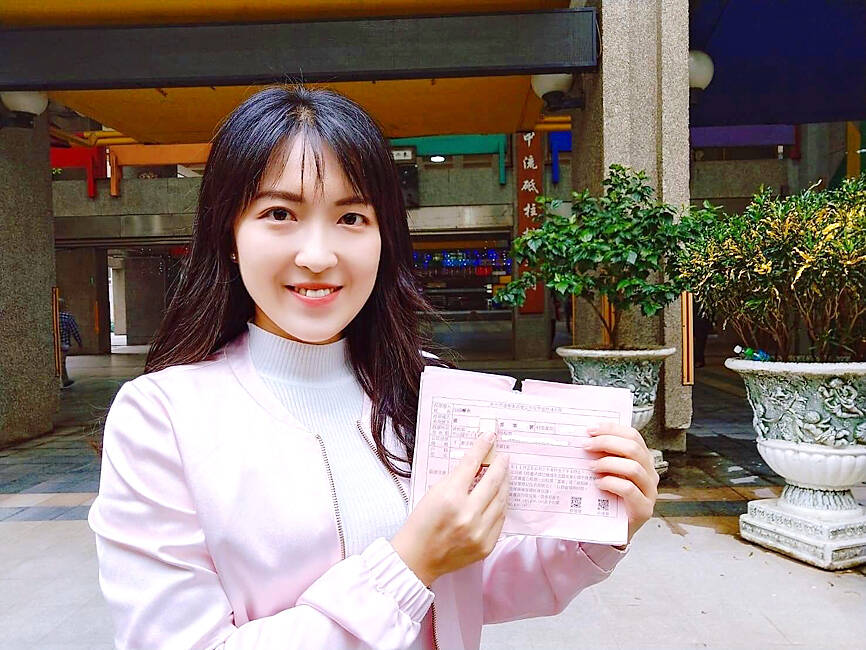First-time politician Mai Yamada’s (山田摩衣) Japanese name has attracted attention in Chinese-language media after her win in the New Taipei City Council election on Saturday.
Born to a Taiwanese mother and Japanese father, the 32-year-old Taiwanese-Japanese stood out after becoming one of nine elected city councilors in Banciao District (板橋) in the nation’s local government elections on Saturday.
Although she has a Japanese name, she grew up and was educated in Taiwan, Yamada said, adding that “Taiwan is my home.”

Photo courtesy of Yamada’s campaign office
Before running for local government, Yamada, who speaks fluent Japanese and English, was Legislative Speaker You Si-kun’s (游錫堃) secretary.
She has been involved in politics since she was a senior at university and worked in the office of former Democratic Progressive Party (DPP) lawmaker Kao Jyh-peng (高志鵬).
During her time serving the local community, she also learned to speak Hoklo (commonly known as Taiwanese). She continued her political work by serving as a campaign assistant for Legislator Yu Tian (余天) when he ran in a legislative by-election in 2019 for the DPP.
Having worked in politics for a decade, Yamada decided to run for a councilor position in Banciao.
To canvass for votes, she visited people doing morning exercise in parks and stood near Mass Rapid Transit station exits to talk to commuters and ask for their support.
During her campaign, many local residents cheered her on, she said, describing the support as proof of Taiwan-Japan friendship.
During her campaign, most people were curious and amazed about her name, rather than resentful, she said.
She attributed such reactions to a society in which people uphold democracy and are keen to make international friends.

Alain Robert, known as the "French Spider-Man," praised Alex Honnold as exceptionally well-prepared after the US climber completed a free solo ascent of Taipei 101 yesterday. Robert said Honnold's ascent of the 508m-tall skyscraper in just more than one-and-a-half hours without using safety ropes or equipment was a remarkable achievement. "This is my life," he said in an interview conducted in French, adding that he liked the feeling of being "on the edge of danger." The 63-year-old Frenchman climbed Taipei 101 using ropes in December 2004, taking about four hours to reach the top. On a one-to-10 scale of difficulty, Robert said Taipei 101

Nipah virus infection is to be officially listed as a category 5 notifiable infectious disease in Taiwan in March, while clinical treatment guidelines are being formulated, the Centers for Disease Control (CDC) said yesterday. With Nipah infections being reported in other countries and considering its relatively high fatality rate, the centers on Jan. 16 announced that it would be listed as a notifiable infectious disease to bolster the nation’s systematic early warning system and increase public awareness, the CDC said. Bangladesh reported four fatal cases last year in separate districts, with three linked to raw date palm sap consumption, CDC Epidemic Intelligence

US climber Alex Honnold left Taiwan this morning a day after completing a free-solo ascent of Taipei 101, a feat that drew cheers from onlookers and gained widespread international attention. Honnold yesterday scaled the 101-story skyscraper without a rope or safety harness. The climb — the highest urban free-solo ascent ever attempted — took just more than 90 minutes and was streamed live on Netflix. It was covered by major international news outlets including CNN, the New York Times, the Guardian and the Wall Street Journal. As Honnold prepared to leave Taiwan today, he attracted a crowd when he and his wife, Sanni,

Two Taiwanese prosecutors were questioned by Chinese security personnel at their hotel during a trip to China’s Henan Province this month, the Mainland Affairs Council (MAC) said yesterday. The officers had personal information on the prosecutors, including “when they were assigned to their posts, their work locations and job titles,” MAC Deputy Minister and spokesman Liang Wen-chieh (梁文傑) said. On top of asking about their agencies and positions, the officers also questioned the prosecutors about the Cross-Strait Joint Crime-Fighting and Judicial Mutual Assistance Agreement, a pact that serves as the framework for Taiwan-China cooperation on combating crime and providing judicial assistance, Liang